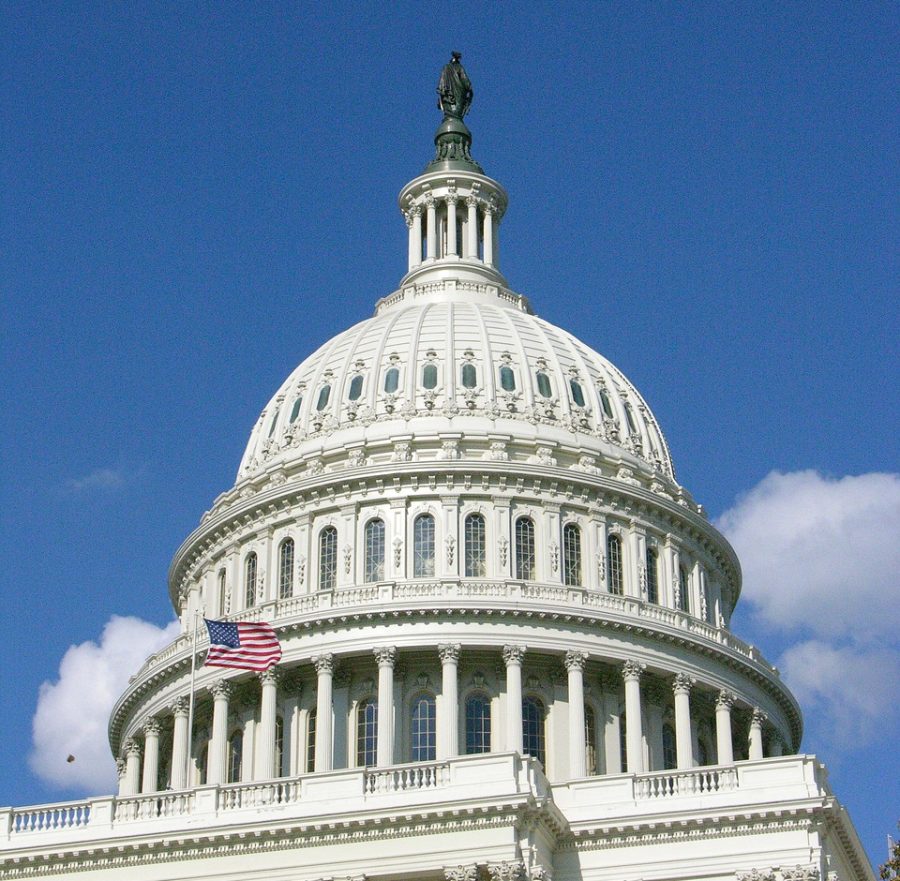January 6 Committee public hearings are set to begin at the end of the month
The American flag flies in front of the U.S. Capitol Building.
The House Jan. 6. committee, which is tasked to investigate the events surrounding the 2021 invasion of the U.S. Capitol, will resume its hearings on Sept. 28., according to Committee Chairman Bennie Thompson.
“That’s the goal at this point. We are looking at the process of being able to look at the report… as well as closing the loop on any potential witnesses,” he said. It would be the first gathering since the panel concluded its summer sessions on July 25.
Thompson also said the intention is to create an interim report by mid-October and finalize the document before the end of the year.
“We sunset at the end of December,” Thompson said.
With the midterm elections in November, the panel is set to finish its investigation and release its report soon. Currently, Republicans are expected to win back control of the House of Representatives. If the party is in control when the next Congress is sworn in come January, they will likely shut down the committee.
“Obviously, if the Republicans win the midterms, the committee is going to be folded up,” Andrew McCarthy, a former federal prosecutor, told TIME. “They’re under some time pressure to get that out. It’s obvious that there’s a Democratic strategy to make Trump front and center because that’s politically helpful.”
He also said, “If this had been a normal investigation, rather than one that had been on a compressed time frame, then I think they would have done a lot of things differently. The pace would be different.”
The committee is still seeking testimony from conservative activist Ginni Thomas, wife of Supreme Court Justice Clarence Thomas. Getting her to testify has been a month-long goal, Thompson said, and that any appearance by her had to be “delayed” due to “some things that happened.”
Ginni Thomas attracted the committee’s attention after it became public that she had corresponded with John Eastman, a lawyer involved in the campaign to pressure former Vice President Mike Pence to refuse to certify the election. Thomas also attended the former President Donald Trump’s rally at the Ellipse that preceded the Capitol attack and urged former Trump chief of staff Mark Meadows to assist in overturning the 2020 election results.
The panel is also looking for another segment of emails from Eastman, who had previously testified before the committee and repeatedly pleaded the Fifth.
Former House Speaker Newt Gingrich, Pence and potentially Trump are among the others on the committee’s list.
In past hearings, the Congressional Committee has released video and photographic evidence from Jan. 6, which included never-before-seen-outtakes of Donald Trump’s video to his supporters, video of Senator Josh Hawley running from Capitol attackers he had previously encouraged and an appeal from Rep. Liz Cheney to those who supported Trump that day.
Trump, the committee already said, was directly involved in trying to have election workers and lawmakers at both federal and local levels declare him the winner of the race over President Joseph Biden. Some of the officials that Trump pressured were Pence, Georgia Secretary of State Brad Raffensperger and Arizona State House of Representative Rusty Bowers.
Trump and Pence had a phone call hours before the joint congressional session to confirm the votes began, in what onlookers described as a “heated” conversation. As the Capital attack unfolded and the mob threatened to kill the vice president, Pence was forced to hide in an underground location while Trump continued to criticize him on social media.
“President Trump is wrong. … I had no right to overturn the election,” Pence said at a speech earlier this year. “The presidency belongs to the American people, and the American people alone. And frankly there is almost no idea more un-American than the notion that any one person could choose the American president.”
Georgia Secretary of State Brad Raffensperger was one of the most pressured local officials, as Trump fixated on his loss in the Peach State.
The phone call between Raffensperger and Trump revealed the former president asking Raffensperger to “find” 11,780 votes in Georgia- just one vote over the margin by which he trailed Biden. At one point on the call, Trump suggested that his inaction could mean he was criminally liable, but Raffensperger denied Trump’s request and his false assertions including his claim that thousands of dead people voted in the election.
Rusty Bowers became emotional as he described to the committee the tool of being asked to violate his oath of office. Trump asked Bowers to help with a plan to replace the state’s electors committed to Biden during a phone call weeks after Trump lost the election. Bowers insisted on seeing evidence of voter fraud, which he said Trump was never able to produce.
Speaking to ABC News Chief Washington Correspondent Jonathan Karl, he was asked if he ever considered going along with Trump’s plan. Bowers said, “The idea of throwing out the election of the president is like, okay, so what part of Jupiter do I get to land on and colonize?”
There has been a lot of media coverage of the hearings, and some students have not been following the action. Sophomore health science student Hannah Zutant says that it’s been “hard to follow” because there’s been “too much going on in the world, it’s been too crazy to watch it.”
Hearings can be viewed on major television networks including ABC, CBS, CNN, NBS/MSNBC, CNBC and Fox Business. The hearings will also be live-streamed and available to watch in full on C-SPAN and on the select committee’s Youtube channel.




